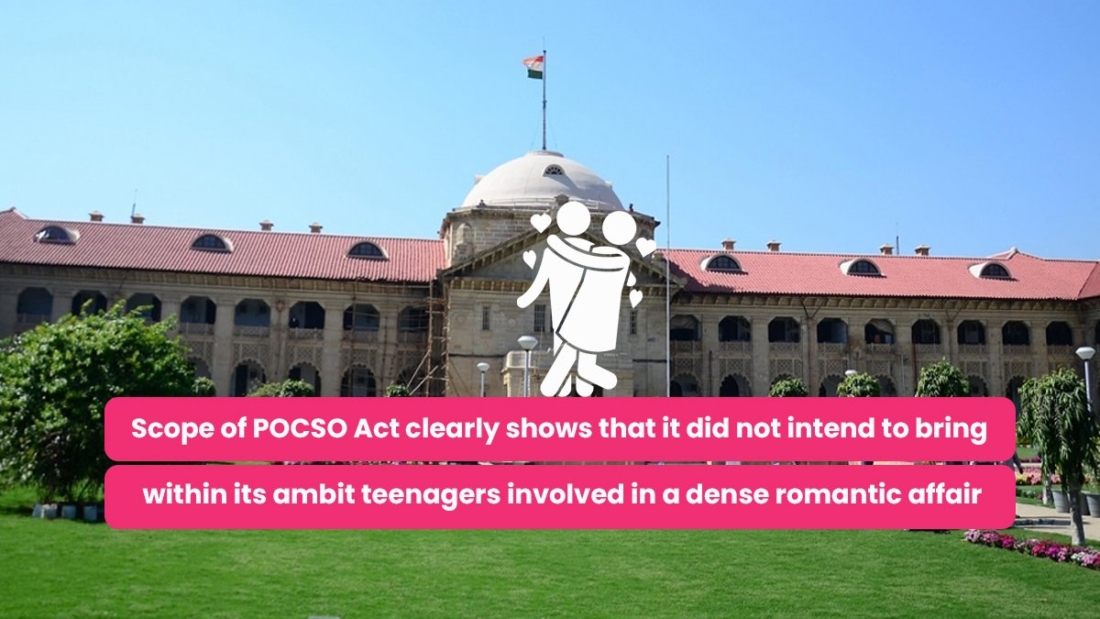In the case of AM Vs. State of Uttar Pradesh, the Allahabad High Court on 25.01.2022 held that the POCSO Act did not intend to cover teenage relationships under its ambit and granted bail to a teenage boy who got married to a teenage girl.
Facts– The Victim was a student of XI standard and was in a relationship with the Applicant for the last three years. One day, both of them ran away without informing their family or friends and reached Delhi. They got married in a temple and started living as husband and wife in a rented accommodation. During this period, the Victim gave birth to a baby boy who was now a few months old. After the couple was found to be missing from their school, the father of the Victim filed an FIR against the Applicant on the ground that he enticed her away. Initially, there was no progress in the case for a while, the police received a tip from an informer after one year and they arrested the couple. Since the Victim was a minor, she was sent to a Shelter Home in Prayagraj along with her baby while the Applicant was sent to jail. Charges against the Applicant were filed under Sections 363 (Kidnapping), 366 (Kidnapping/abducting to compel for marriage) and 376 (Punishment for rape) of the Indian Penal Code (IPC), Sections 3 and 4 (Punishment for penetrative sexual assault) of the Protection of Children from Sexual Offences Act, 2012 (“POCSO Act”) and Sections 3(2)(v) (Committing any offence against the body/property of a Scheduled Caste/Scheduled Tribe person) and 3(2)va (Schedule for Offences) of the Scheduled Castes and Scheduled Tribes Act since the Victim belonged to the ‘Pasi’ community. The Victim was retained at the shelter home with her baby according to the order passed by the Juvenile Justice Board and the Applicant’s bail application was also rejected by the Special POCSO Court at Fatehpur. Hence, he filed the present bail application before the Allahabad High Court.
Observations by the Court– The Court observed that the evidence on record proved that the Victim was indeed a minor. There was no dispute about the fact that the consent of a minor holds no value in the eyes of law. However, the applicability of a penal provision is not a mathematical theorem and the main objective of any law is to be flexible in extraordinary situations.
Judge M. Kumar commented that-
“Enactment of POCSO Act was to effectively address the heinous crime of sexual abuse and sexual exploitation of children. The Act was introduced to provide protection of children from the offences of sexual assault and harassment etc. This Act also provides for safeguarding the interest of the child at every stage of judicial process. But this laudable object must have some genuine and inherent exceptions too. It is imperative for the Court of law to draw thin line that demarcates the nature of acts that should not be made to fall within the scope of this enactment. There are certain gray areas, where the severity of the sentences provided under the Act, rightly so be diluted keeping in view the facts of each case. If these rigors of the enactment is pasted hastily or irresponsibly, it could lead to irreparable damage to the reputation and future of young whose actions would have been only innocuous and may lead to spoiling the future life of that innocent lovers or couple who out of sheer innocence have initially developed and thereafter established that relationship, which if seen through the bioscope of these penal provisions of Act of 2012, would fall within the realm of offence.”
A reading of the statement of object in the POCSO Act would be sufficient to realize that it intended to protect children from the offences of sexual assault, sexual harassment and pornography. However, a large number of cases under the POCSO Act are filed by the family members of teenagers who are in a consensual relationship. The Court emphasized that
“The scheme of the Act clearly shows that it did not intend to bring within its scope or limits, the cases of the nature where the adolescents or teenagers involved in the dense romantic affair.”
The Court observed that the psychology and the influence of hormones in teenagers need to be considered and while the parties in the present case may have made an immature or hasty decision of getting married at a young age in order to stay together, it wasn’t a sin of such a level that an FIR had to be filed. The Victim had ran away with the Applicant to get married and even had a baby of a few months with him. She was clear that she wished to stay with him and did not want to go back to her parents. It was cruel to deprive a baby of a few months of parental love and affection just because his parents got married as minors.
The Court decided to grant bail to the Applicant and imposed a condition that he should give an assurance that he was more than willing to keep his wife and baby with him and directed him to produce a bank draft of Rs. 5 lakhs in their name and hand it over to the Victim within six months from the date of bail.
Vaishali Jain, Advocate & Associate – Child Safety at Work & Rhea Bazaz, Final Year Student, Symbiosis Law School, Pune
 Cart is empty
Cart is empty 

